Laurence Gale, TurfPro editor writes . . .
As a member of the newly formed Parks Management Forum I would like, over the next few weeks, to introduce you to some of the key members of the Forum so that we have a better understanding of the role parks managers play in managing and maintaining our vital public open spaces that we have treasured during this Covid-19 pandemic.
These key people who have spent many years working for local authorities are best placed to inform us of the many issues and challenges they face managing these wonderful assets.
Most of us would agree these parks and public open spaces have been essential to the wellbeing of thousands of people and are now more popular than ever. However, to ensure their future we need to begin investing appropriate monies and funding to retain these parks and allow these dedicated parks professionals to be able to deliver these core services for the next generations.
The Forum has not been set up to lobby for the need for good-quality public parks. That case has been made incessantly over the last twenty five years. It has been set up to give a voice to parks professionals, who know more about these places than anyone. We work in them daily; we know our trees and our flowers, our water management and our ice-cream sales, but we also know our users; we know how vital parks are across our communities, and especially in poorer communities. These are not pay-per-entry leisure facilities or stately homes; free access to good quality parks and open spaces is as fundamental to physical and mental health as free access to health care.
This Forum represents an unrivalled reservoir of understanding, expertise, and dedication. Running parks is an expert job and we are determined to make our voice heard by politicians as they formulate policies and make financial decisions which have huge repercussions for the viability of public open space. For too long parks, as a discretionary service, we have been a poor relation of other public services, down the pecking order as just a ‘nice-to-have’. The Covid-19 crisis has shown that is not where they belong.
Over the coming months, we will establish this Forum as the authoritative source of information about public parks and park management. It will be a resource for professionals and a shop window for what we do. And we will begin the long job of re-establishing the park professional as a key part of the delivery of healthy, resilient communities.
Chris Worman MBE FLI - Rugby Borough Council’s parks and ground manager
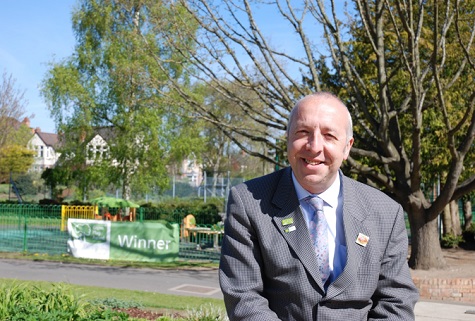
Chris Worman MBE has over 36 years’ experience in the parks industry and is currently Rugby Borough Council’s parks and ground manager.
His responsibilities including managing and maintaining over 350 hectares of green space across Rugby which range from town parks and play areas, to woodland, nature areas and small amenity spaces. Another key role is supporting the planning department in the future planning of green infrastructure in a fast expanding borough. Working for a small authority he also finds himself picking up other responsibilities such as road closures under the Town & Police Clauses act, special events and war memorials.
Chris started his career as an apprentice gardener for Leicester City Council and quickly moved through the ranks to become a team leader, before moving onto Hinckley & Bosworth Borough Council as parks and cemeteries officer. Whilst working at Hinckley, Chris gained a post graduate degree in management studies from De-Montfort University. In 2002 he moved to Rugby Borough Council where he has been manager for 18 years.
He has been a member of the West Midlands Parks forum for over 20 years where he served as vice chair and is now a volunteer supporter of the Midlands Parks Forum.
Being passionate about parks and green spaces for as long as he can remember, he became a Green Flag Award judge from the very start of the awards and over the past 24 years volunteering has had the opportunity to judge 100’s of parks both around the UK and beyond. He has undertaken a number of international judging tours including Spain, the Middle East, Mexico and America.
For his service to the Green Flag Awards and public parks he was awarded an MBE in the Queens 90th Birthday honours in 2016.

In 2017 Chris was appointed to the governments Parks Action Group as the parks industry representative and was invited to be a Fellow of The Landscape Institute in 2019.
What made you choose a career in local authority parks management?
Growing up in the inner city, parks were always an important part of my childhood. Whether for a picnic, just feeding the ducks, or sledging in winter, these spaces provide a wealth of happy memories. I therefore always knew that I could never work in a factory. In addition, I was often drafted in to help on my father’s allotment, so it seemed a natural step to apply for a job with the local authority parks department. I was lucky enough to finish school at 16 and straight away started work as an apprentice gardener at £40.00 a week.
The rest, as they say, is history.
How many staff do you manage and what portfolio do you sit in?
We sit within the Environment and Public Realm Portfolio. I manage a total of 29 staff which range from the gardeners and grounds staff to arboricultral officers, green space officers and a park ranger. These intern work with countless volunteers who support the work that we do. (over 15,000hrs of volunteering in 2019).
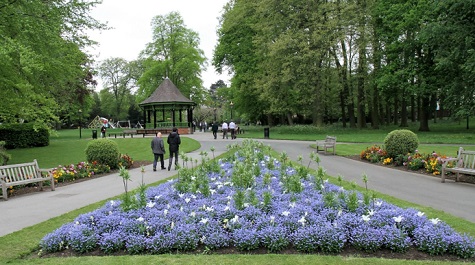
Are your staff in-house, private contractor or a mix of both?
Our grounds maintenance is provided in-house and that also sits within my service. However, I like to think that we also understand our limitations and use contractors where it makes both practical and financial sense. For example, all our arboricultural services are provided externally.
What have been the significant challenges you had to face in managing your parks and opens paces in the last few years?
The biggest challenge quite simply has to be the effects of austerity, the large cuts in budgets which has led to a loss of staff. This has proved particularly hard when we have been forced to reduce standards, which has resulted in a lot of negative public feedback. This can be demoralising for staff who take a pride in their work. And all at a time when the public’s expectations and demands for improvements have never been higher.
To some extent we have been our own worst enemy as a lot of this has been hidden by the extraordinary efforts of the staff within the parks sector to adapt and change. Dare I even say that some of us still believe in public service?
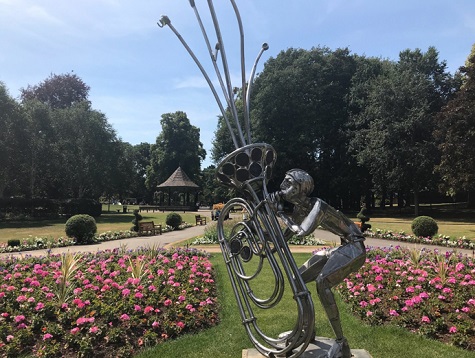
How have you coped with the repercussions of the Covid-19 pandemic?
We have all had to cope in different ways. Most of my grounds staff were redeployed to delivering food and medicines to our most vulnerable communities who were shielding. All other staff have been either working from home or been out ‘on the ground’ dealing with issues such as enforcing the play area closures, and social distancing rules. And as lockdown has eased the reopening of facilities.
The redeployment of staff has resulted in a 3-month backlog of work and, with the gradual lifting of lockdown, the public expect things to be back to normal straight away. Which of course they are not. It will require a Herculean effort to try to catch up as some green spaces will have seen no maintenance for months with revised work schedules and working patterns to ensure social distancing for staff. On the flip side with only undertaking very skeleton maintenance some areas have seen an increase in longer grass and along with it, a significant biodiversity bonus.
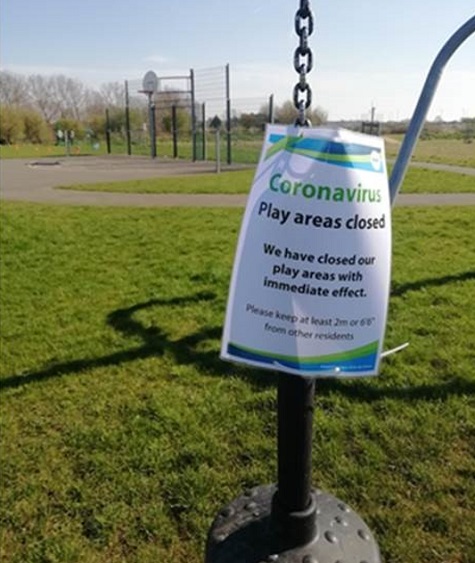
Whilst Covid-19 has brought many challenges to the sector, it has also focused a lot of attention on how people engage with their local green space. Some people have rediscovered spaces on their doorstep that they haven’t visited in years, whilst others struggled not to sit on the grass, soak up being outdoors and enjoy the sunshine, even when they knew they shouldn’t.
This has been most evident in those communities across the UK where residents live in high-rise flats, apartments and terraced houses with no gardens. Sometimes located in our most disadvantaged communities, the need to access quality green space for mental and physical wellbeing is vital, albeit whilst abiding by social distancing. It has also highlighted the social inequality between those that can access quality green space and those than cannot. It has also seen our communities visit parks in their thousands as we all try to cope with so many of taken for granted freedoms which were temporarily curtailed.
What are the new challenges for your service coming out of Covid 19?
The challenges are very similar to before Covid-19, but just magnified even bigger. The public have discovered the very local green spaces that haven’t been invested in for years and are already wanting improvements. Local authority budgets are already on their knees just months into the new financial year. We have also suffered a significant loss of income since March with no cafes open, no sport being played and no events, so we need to see what the long term impact of this may be.
Whilst all of this is a challenge, it also presents a unique opportunity to change the way we view and value our green spaces. If the political will is there for a real green recovery, with parks and green spaces at the centre, we could see a new green Britain emerging from the pandemic. Wouldn’t that be a great legacy to the tens of thousands of people that have sadly died and the shared experience that we have collectively lived through? This could help bring jobs, economic growth, community engagement, inward investment, biodiversity gain and improved public health.
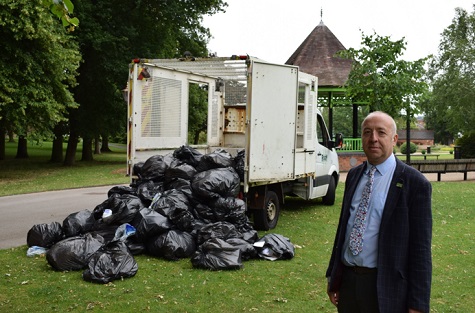
Another challenge is the impact of the sheer number of people that are now using parks, ( estimates range from 136%-300% increase) along with the reasons they are using them. For many months Parks were the only place where people could socialise so they became impromptu pub gardens or eateries with major issues of litter. If these numbers are sustained then the costs in increased litter collection, inspections and patrols and toilet cleaning along with general wear and tear will need to be addressed.
Do you think we will have a problem attracting new people into the parks sector in the coming years?
This is one of our biggest challenges, and one we need to overcome. It is vital that we attract new people from across all our communities. The problem is who wants to join local authorities that spend a lot of its time just cutting services? Its not the most attractive job advert!
However we need a new younger, and more diverse workforce who are fired up by the issues of climate change, biodiversity, community and social inequality to bring a renewed energy into the parks sector. And there are lots of great people already in the sector who share this passion and can help mentor them. Despite all the challenges it still a great sector to be part of. You do have opportunities to make a difference, sometimes, small and sometimes big and from my experience you get out of it what you put in.
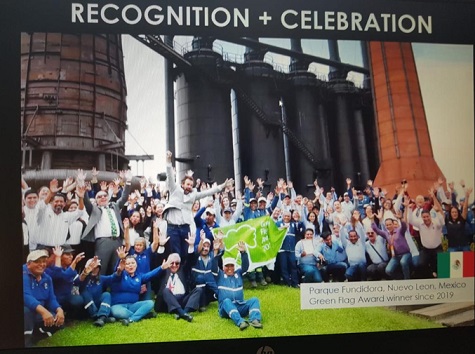
We are also lucky to have the Green Flag Awards scheme that brings unique learning experiences that are priceless to anyone that wants to see the diverse range of parks and green spaces, and the potential career opportunities that exist within the sector. Being part of this also helps you connect with colleagues across the country (and in my case the world) and gives a sense of being part of a wider (global) industry.
What changes would you like to see to help parks professionals deliver the best possible service?
To me the elephant in the room has to be recognised and discussed. We need long term sustainable funding that provides equal provision and protection of quality parks and green spaces for all. To that end we must engage in the debate over public money for public good. Whilst there are a few unique examples for small scale income generation opportunities this will never become a mainstream source for the majority of public parks. If we have money, we have staff, if we have staff we can be innovative and creative, flexible and adaptable and actually start to deliver on some of the big issues of today, such as the public health and climate emergencies.
To achieve this we need cross party political support and a national parks and green spaces strategy / framework, similar to those of litter and recycling. The debate needs to move away from the cost of cutting grass, to the value of having quality, usable, accessible and safe green spaces that meet the expectations and needs of our communities. To invest in parks is an investment in the nation’s health and wellbeing.
How do you think the newly formed Parks Management Forum can help you to promote and enhance the opportunities and work of the parks professional?
The Parks Management Forum in key in getting the voice heard of the rank and file parks professionals that, day in day out, managing tens of thousands of parks across the UK. These are people that have kept going throughout all the challenges of the past 30 years, and these are the people that can deliver on the ground in the future.
Promoting the parks agenda across all levels of both local and national government is key, along with collaborating with all the other bodies that have an interest in the parks and green spaces agenda.
In the world of the 21st century parks manager it can also support parks professionals with a parks and green space library where you can find information, guidance and support, or signpost people to where this may exist.